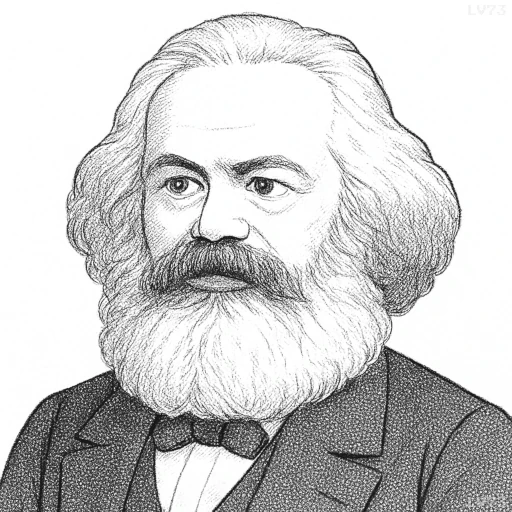“The production of too many useful things results in too many useless people.”

- May 5, 1818 – March 14, 1883
- Born in the Kingdom of Prussia (Germany)
- Philosopher, economist, political thinker
table of contents
Quote
“The production of too many useful things results in too many useless people.”
Explanation
In this quote, Marx is commenting on the alienating effects of industrial capitalism and the overproduction of commodities. While it may seem that producing more useful things would benefit society, Marx suggests that in a capitalist system, the excessive production of commodities does not necessarily improve people’s lives. Instead, it leads to the creation of a situation where people become disconnected from meaningful work. In such a system, labor is often reduced to repetitive tasks in factories, and people are treated as mere cogs in the machine, performing tasks that do not connect them to the overall purpose of society or contribute to their personal fulfillment. The result is the production of “useless people”, individuals who are alienated from their work and who no longer feel a sense of agency or value in their roles, as their labor is simply a means to an economic end rather than an expression of creativity or human potential.
Historically, this critique reflects Marx’s concerns about the mechanization and division of labor under capitalism, where the rise of industrialization and the mass production of commodities led to alienation—the separation of individuals from the products of their labor. Workers were increasingly required to perform narrow, repetitive tasks, making them feel like their labor was meaningless, as they had little control over the production process or its end product. The result was not just a society of material abundance but also one of human poverty, where people’s potential was stifled by the narrow confines of industrial labor. The idea of creating “too many useful things” while leaving the human being disempowered and alienated is central to Marx’s critique of capitalism.
In modern contexts, this quote remains relevant in discussions about automation, consumerism, and the gig economy. As automation and technological advancements continue to replace human labor, many people are left in jobs that are low-wage, unstable, or meaningless, contributing to feelings of alienation and disposability. The proliferation of goods that are designed to be consumed rapidly, rather than meeting fundamental human needs, also contributes to a sense of emptiness and overconsumption. The focus on profit maximization and efficiency in production often leaves workers feeling disconnected from the products they make and unable to find deeper fulfillment in their work. Marx’s quote highlights the tension between material abundance and human well-being, suggesting that while the production of goods may increase, true fulfillment can only be achieved when people have control over their labor and its impact on society.
Would you like to share your impressions or related stories about this quote in the comments section?
